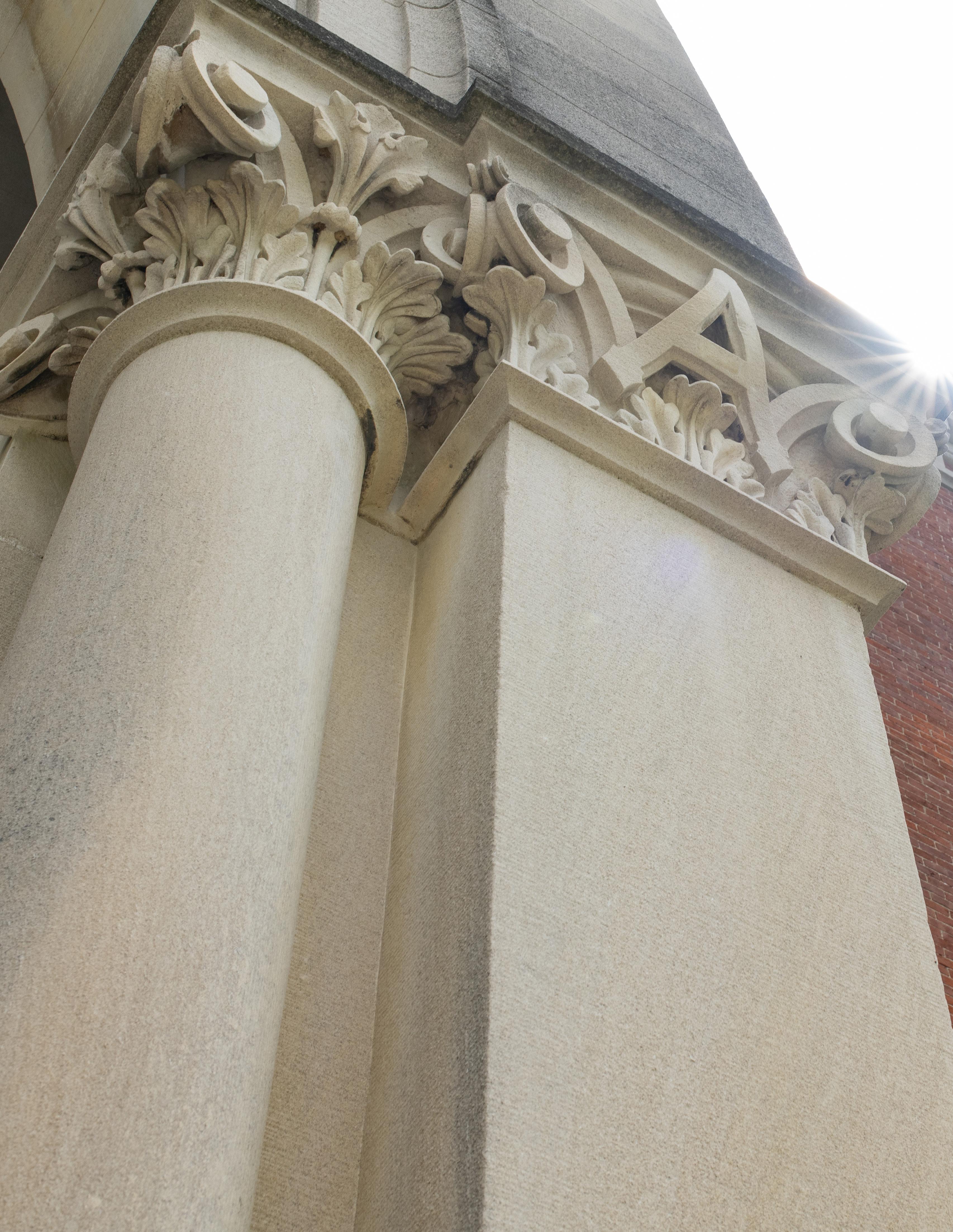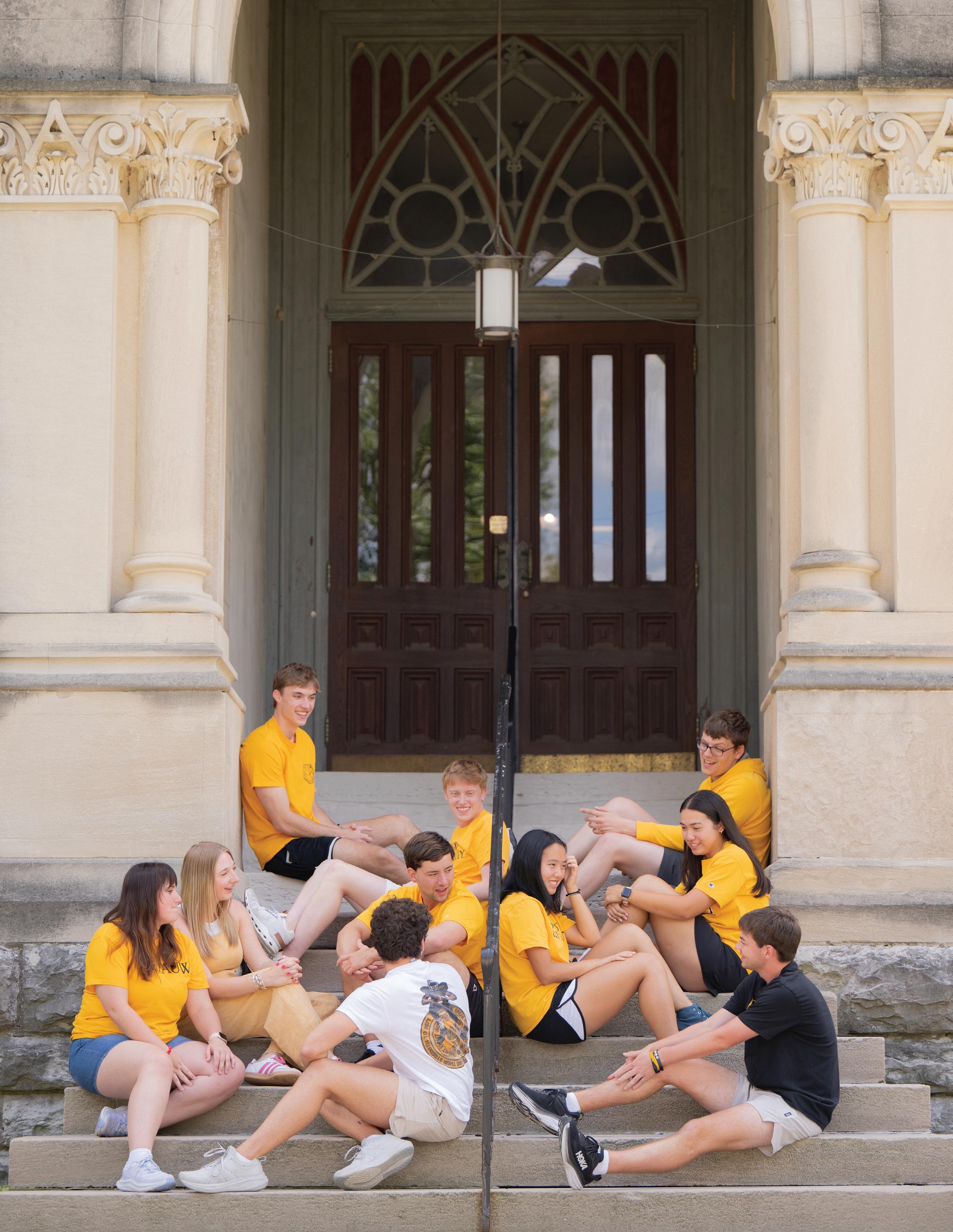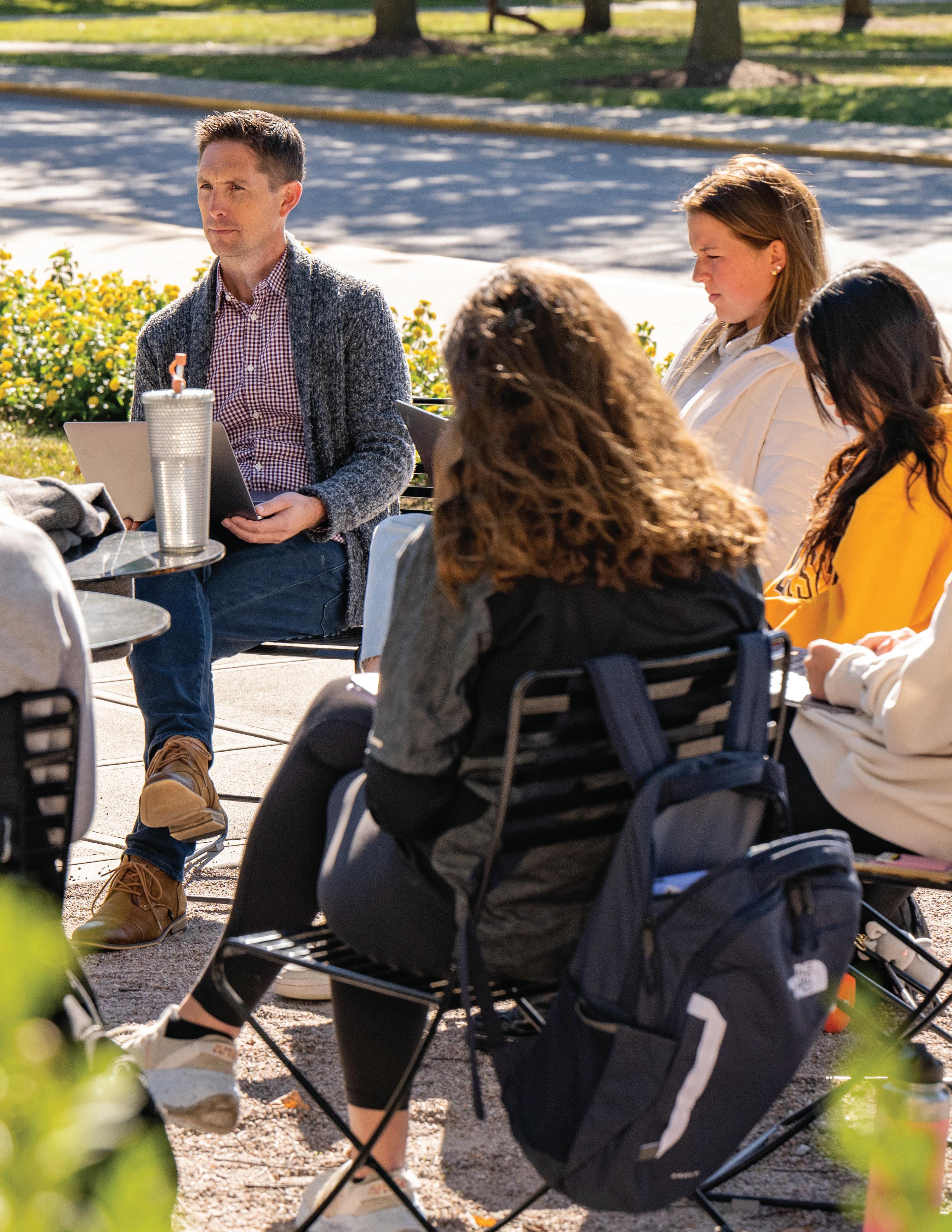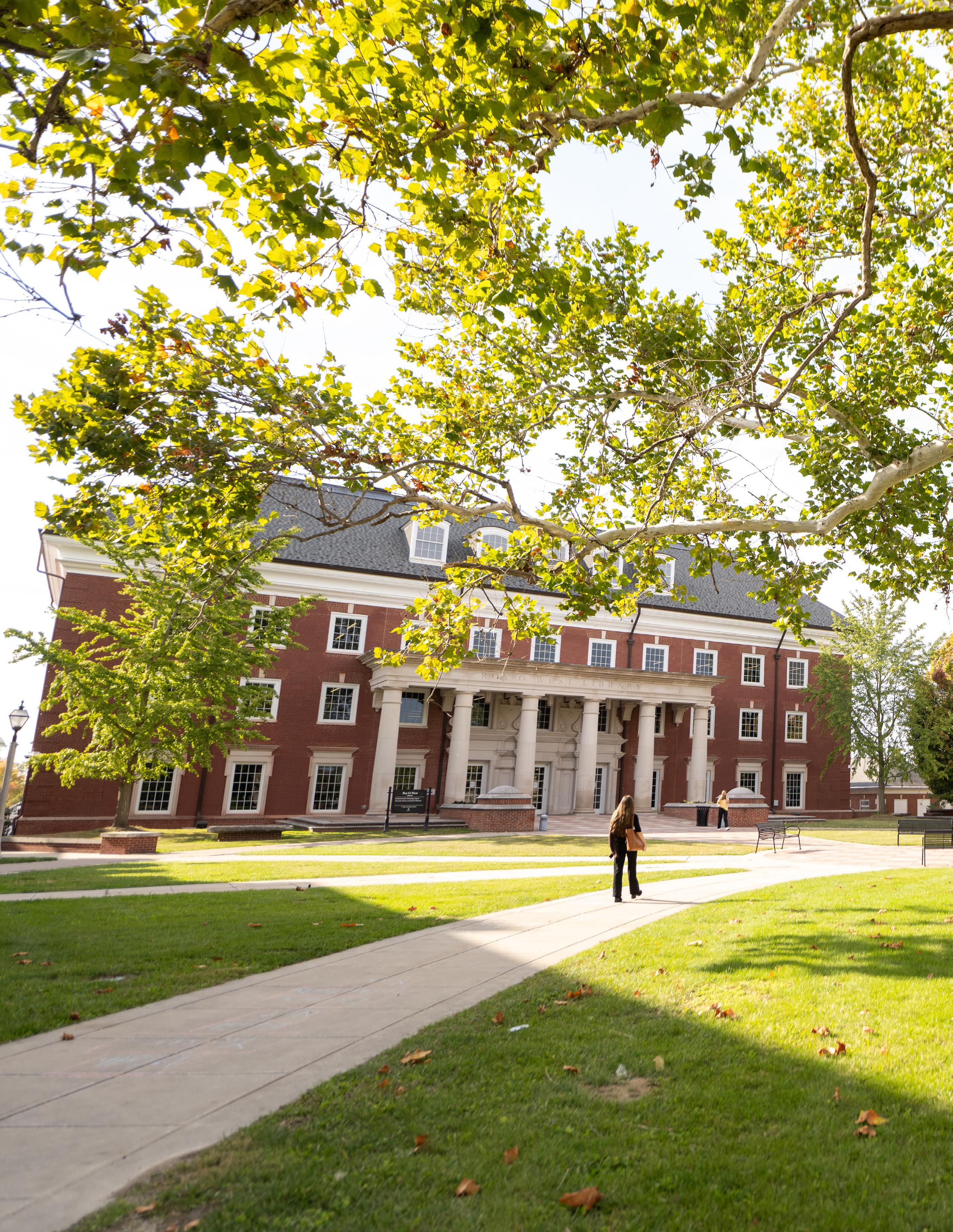Bold & Gold 2027

Plan Update



Plan Update

DePauw University’s Bold & Gold 2027 strategic plan reflects an ambitious, integrated response to the challenges and opportunities facing higher education today. Rooted in a historic commitment to the liberal arts and guided by the university’s mission, vision and values, DePauw has advanced its institutional priorities across four central goals:
• Academic Renewal.
• Exemplary Student Experience.
• Institutional Equity.
• DePauw as a Flourishing University.
As work continues through 2027, DePauw is making progress and investments in innovation. Initial results from the first 2 1/2 years of the plan demonstrate meaningful momentum, disciplined stewardship and enduring alignment with our mission, vision and values.
DePauw introduced the School of Business and Leadership and launched the Creative School. It is strengthening the College of Liberal Arts and Sciences to meet the evolving interests of its students. New majors, academic collaborations and the universal Exploratory Foundations (general education) curriculum are broadening and more clearly articulating academic pathways. Clearer governance and ongoing curriculum review sustain DePauw’s distinctive three-school approach.
A campuswide housing renewal project will transform residential life, supporting student development during each class year and expanding living-learning communities. Enhanced well-being resources, an expanded focus on mental health and increased student engagement, including strong participation in fraternities and sororities, define recent progress. Strategic investments in updated facilities and inclusive programming foster a vibrant and welcoming student experience for all.
The Division of Institutional Equity leads a university-wide commitment to diversity, inclusion and compliance with civil rights statutes. The university is committed to welcoming, supporting and affirming all members of our community. Initiatives such as comprehensive climate surveys and the Black and Gold Student Success Initiative have improved retention and campus belonging. Data-driven strategies and collaboration across divisions ensure that equity efforts are both strategic and embedded in DePauw’s values. Key next steps include advancing employee mentorship, implementing climate survey recommendations and further building cross-disciplinary inclusion.
DePauw’s fiscal stewardship has reduced endowment draw, increased budget transparency and spurred significant workforce investment. The implementation of the Workday platform is laying the foundation to enhance operational efficiency. Robust partnerships, particularly the transformative Growing Green and Gold Together initiative, strengthen both the campus and the Greencastle community. As the university advances its priorities, it remains adaptive and resilient, focused on sustainable growth and mission-driven impact.
This midpoint report affirms that DePauw’s strategic plan is achieving significant early results while remaining focused on the objectives required to secure lasting excellence and distinction.
Collectively, these initial efforts position DePauw to innovate. The strategic plan delivers a cohesive vision that aligns mission-driven changes with operational rigor. Through DePauw’s commitment to academic excellence, student engagement, institutional equity and fiscal stewardship, the university positions itself as a leading liberal arts institution prepared to thrive.

PREAMBLE
Each generation encounters new challenges and opportunities, calling it to reaffirm and clarify its foundational commitments in the face of adversity and change. DePauw University views these shifts not as obstacles but as opportunities to lead with purpose. Rooted in the enduring traditions of the university’s Methodist heritage and centered in an ongoing commitment to the liberal arts, DePauw is committed to preparing graduates for meaningful careers and purposeful lives as engaged citizens and leaders. DePauw’s mission, vision and values reflect a commitment to nurturing rigorous intellectual engagement, fostering diverse and inclusive communities and integrating academic and co-curricular experiences that promote lifelong learning. As the university navigates current complexities, DePauw remains resolute in the pursuit of academic excellence, ensuring that every member of the community is prepared to lead with integrity, insight and a commitment to the common good.
MISSION
The DePauw University mission statement, last updated in 2017:
DePauw University develops leaders the world needs through an uncommon commitment to the liberal arts.
DePauw’s diverse and inclusive learning and living experience, distinctive in its rigorous intellectual engagement and its global and experiential learning opportunities, leads to a life of meaning and means. DePauw prepares graduates who support and create positive change in their communities and the world.
VISION
As a great place to learn, live and work, DePauw will become a university of choice and distinction known for the integration of its rigorous liberal arts curriculum and robust cocurriculum and its unique commitment to the success of each student.
CORE VALUES
Student Focus
Collaboration
Curiosity
Diversity
Inclusion
RELATIONAL VALUES
Commitment to Excellence
Trust
Integrity
Respect



The academic renewal process at DePauw has prioritized centering and strengthening the College of Liberal Arts and Sciences, while introducing two innovative new schools: the School of Business and Leadership and the Creative School.
Under the leadership of its inaugural dean, Dr. Bridget Gourley, the College of Liberal Arts and Sciences stands as the academic cornerstone of the university, advancing DePauw’s commitment to rigorous intellectual inquiry and broad-based learning.
A number of notable developments are focused within the College of Liberal Arts and Sciences. For example, the launch of the Global Studies Fellows Program, a new, interdisciplinary opportunity grounded in the liberal arts, is already attracting a large number of students in ways that further DePauw’s mission of cultivating leaders for a complex world. All DePauw students, regardless of major, now complete the same set of Exploratory Foundations graduation requirements. The large majority of these courses are housed in areas associated with the College of Liberal Arts and Sciences, which means the college’s offerings now have an even more significant impact on every student.
With regard to facilities, the university constructed a new suite for the Classical Studies Department in Asbury Hall. It built new office and laboratory space for the Department of Psychology and Neuroscience in the Percy Julian Science Center, bringing this department together with many other science departments.
Most recently, the addition of a journalism minor – housed in the English Department and listed as an offering within the College – demonstrates a continued evolution of dynamic,
relevant curricula. Regular program assessments have also driven substantive revisions in majors such as political science and computer science, ensuring continuous improvement and alignment with contemporary academic standards. Through these efforts, the College of Liberal Arts and Sciences reaffirms its vital role in shaping the academic excellence and intellectual vibrancy that distinguish a DePauw education.
The School of Business and Leadership launched in fall 2023 under the inaugural leadership of Dr. John Clarke. Key developments include the approval and implementation of new majors such as finance and business analytics, alongside new minors in entrepreneurship and leadership and revisions to the actuarial science and risk management major. Enrollment confirms strong interest in the School of Business and Leadership offerings.
Renovations to Harrison Hall have established a contemporary learning space, including the integration of Bloomberg terminals to enrich student learning and practical experience.
The Creative School, launched under Dean Marcus Hayes, advanced a revised film and media arts major, a new design studies major and a revised creative writing major. Curricular evolution in music includes a revised BA music major as well as a revised BMA music degree.
Scheduled facility enhancements aim to strengthen creative and collaborative environments, with renovations planned for the Green Center for the Performing Arts, Peeler Art Center and Pulliam Center to be completed by summer 2026. In the meantime, a more integrated approach to campus events is designed to help grow audiences and encourage collaboration.

An open and porous structure that encourages collaboration across the three schools embodies DePauw’s academic innovation. Updates to the governance procedures reflect this integrated approach, and all students, regardless of school, fulfill the same general requirements under the Exploratory Foundations curriculum.
Interdisciplinary initiatives are emerging, including the National Endowment for the Humanities-funded “Business Meets Humanities” project, encouraging faculty and students to bridge disciplinary boundaries and explore innovative convergences.
Thirty-two new tenure-track faculty appointments in the last three years have further invigorated curricula across DePauw, fostering a spirit of renewal and adaptability. While these flexible structures enhance connection and broad access, they also present ongoing communication challenges in clearly articulating the role and distinction of each school to all university constituencies.
Program assessment is ongoing across all three schools, resulting in timely curriculum revisions such as updates to political science and computer science. The faculty’s commitment to flexibility, continuous self-study and innovation ensures that DePauw’s academic portfolio remains vibrant, student-facing and aligned with both institutional goals and the evolving higher education landscape.
• Despite broad successes, the disparity in scale among the three schools requires additional consideration regarding the portfolios and responsibilities of the schools’ deans.
• Attracting philanthropic support has proven more straightforward for the newer schools than for the core college, requiring ongoing engagement and storytelling to reinforce the centrality of the liberal arts to DePauw’s mission.
• The university’s distinctive “schools” approach differentiates DePauw, and communicating the flexibility and openness inherent to the model is an ongoing strategic priority.
• The integration of artificial intelligence into academics presents new challenges and opportunities that DePauw is poised to address.
Looking forward, DePauw will focus on deepening interdisciplinary work and curricular renewal, with careful consideration of the opportunities and challenges presented by artificial intelligence. The university will place an emphasis on securing additional resources for academic excellence, further clarifying the approach of the three schools, promoting the central role of the liberal arts in a DePauw education, and more clearly articulating the role and distinction of each school to all university constituencies.



DePauw’s commitment to enhancing student engagement and well-being is evident in the comprehensive renewal of the campus residential experience. The Board of Trustees authorized a comprehensive housing renewal plan, established by the Housing Renewal Task Force as charged by the president, that envisions a developmental model supporting students throughout their educational journey. First-year, sophomore, junior and senior students will each experience tailored residential communities, ranging from a dedicated first-year quad to apartment-style living that prepares upperdivision students for post-graduate life.
Renovations, including the transformation of Mason and Lucy halls, updates to the duplexes and construction of a new first-year residence hall, will significantly raise the standard of student living. The university partnered with academic departments to develop new Living-Learning Communities, such as the Artists’ Salon and the upcoming Entrepreneurship LLC. These initiatives foster community building, support academic and creative pursuits and address student accessibility and sense of belonging.
Student engagement remains robust. Fraternity and sorority participation has increased to 65 percent of the student body, representing the sixth-highest rate in the country for participation in these organizations. National Pan-Hellenic Council organizations have doubled, from two to four, since the strategic plan’s inception. Student-athlete engagement and success remained high during the 2024-2025 DePauw Athletics season, resulting in six NCAC regular-season team championships, four NCAC tournament championships, six NCAA championship team appearances, and seven individual NCAA championship appearances. Athletics and Student Affairs collaborated to develop additional programming for student-athletes, focusing on belonging, leadership and overall well-being both on and off the field. The return of the Student Union Board, the expansion of outdoor events, and the creation of new campus community experiences have further enriched campus life.
The MINDful College Connections Consortium, funded by a grant from the Lilly Endowment, significantly expanded

mental health and well-being resources, increasing access to online counseling and peer support while also offering group options. In the 2024-2025 academic year, Counseling Services supported approximately 20 percent of the student body – an indicator of the community’s proactive stance on wellness.
A hallmark of the student engagement strategy is authentic collaboration with student government and organizations. Students and administrators work together to design community supports, ensuring that programming is meaningful and resonates with the current needs. The DePauw Student Government explicitly cited the Housing Renewal Task Force’s work as a model of transparency and inclusion.
• Housing renewal plans depend on capital availability, with potential financing and construction cost obstacles requiring continued creative problemsolving.
• Programs must remain responsive to changing federal policies and student demographics, ensuring ongoing relevance and sustainability.
• Efforts to maintain and grow fraternity and sorority involvement face national headwinds; DePauw’s deferred recruitment and diverse intake models aim to preserve a vibrant Greek life.
Priorities for the next phase include ongoing implementation of housing renewal recommendations, expansion of strategic partnerships with peer institutions and continued investment in programs that cultivate belonging and mental well-being. The focus will remain on offering inclusive, values-centered student life and strengthening the culture of care across campus.



DePauw has made substantial strides toward realizing the Institutional Equity objectives set out in the Bold & Gold 2027 strategic plan. Notably, the establishment of the Division of Institutional Equity, with structured leadership and targeted resource allocation, has enhanced campus belonging and engagement, reinforcing DePauw’s mission of inclusive excellence.
The administration of comprehensive campus climate surveys represents an important step forward. Among incoming students, 81 percent affirmed that DePauw’s commitment to diversity, equity and inclusion influenced their enrollment decision.
Institutional efforts have fostered a more responsive, datadriven approach, as evidenced by the participation rate in campus climate surveys, which more than doubled – from 13 percent in 2021 to 27 percent in 2025 – for students. More than 50 percent of employees completed the staff and faculty climate surveys in 2023 and 2024.
Signature initiatives such as the Black and Gold Student Success Initiative have delivered robust results, with retention rates of 89.5 percent for one student cohort and 96.2 percent for the following. These rates match or exceed university averages.
Faculty, staff and students have engaged in diversity, equity, inclusion and belonging stakeholder convenings, reinforcing a campuswide commitment to strategic, collaborative progress. Learning opportunities reached more than 1,000 students and 300 employees in the past two years, emphasizing practical approaches to belonging, allyship, healthy relationships,

compliance and inclusive hiring. These workshops consistently earn high satisfaction and learning outcome ratings.
The Division of Institutional Equity ensures DePauw complies with federal civil rights statutes (Title VI, Title IX, the Clery Act and the Americans with Disabilities Act). The division’s focus on strategic collaboration across campus guides the university’s risk mitigation strategies. Early and transparent stakeholder engagement, alignment of messaging and regular measurement of climate and engagement remain central to the division’s work.
• Amid a dynamic national landscape surrounding diversity, equity and inclusion, DePauw remains steadfast in its legal compliance, risk mitigation and alignment with institutional mission and values. DePauw has affirmed that all programs and opportunities are open to all members of our community.
• The university ensures that all efforts in equity and inclusion are firmly anchored in adherence to federal and state civil rights laws, including but not limited to: Title VI, Title IX, the Clery Act and the Americans with Disabilities Act.
• Compliance with these statutes is a foundational requirement and a strategic imperative that protects our students, employees and the university, while fostering an inclusive campus community.
DePauw’s upcoming priorities for Institutional Equity include implementing climate survey recommendations, such as career development and mentoring opportunities for employees. Additionally, the Division of Institutional Equity will continue to administer student climate surveys, including report-outs and focus groups.



A foundational tenet of the Bold & Gold 2027 plan is ensuring DePauw’s financial sustainability. Rigorous assessment and restructuring of expense and revenue streams have enabled the university to consistently reduce the endowment draw, with a targeted reduction to a 5 percent draw by 2029. These fiscal measures have preserved DePauw’s ability to invest in financial aid, compensation and professional development priorities while improving transparency and institutional focus on cost control.
The implementation of the Workday platform for finance, HR and payroll, as well as the ongoing installment of Workday Student, reflect DePauw’s commitment to operational excellence. Delivering this system on schedule and within budget sets a strong precedent for technology-enabled efficiency and data-driven decision-making. Continuous improvement in reporting capabilities will further enable insight-led resource management.
Staff and faculty compensation have been under intense review, resulting in a new staff compensation framework benchmarked to market medians and an ongoing faculty salary analysis. The annual cost of living and equity-based salary adjustments demonstrate clear progress toward DePauw’s goal of being a preferred employer, although this effort still needs further investment.
The university has thoroughly reviewed and recalibrated benefits to align with those of peer institutions, with the retirement plan transitioning to a multi-employer arrangement to enhance employee services and reduce costs.
Growing Green and Gold Together, supported by a historic $32 million Lilly Endowment College and Community Collaboration Grant, highlights DePauw’s proactive engagement with the Greencastle community. Projects such

as a new multi-family housing complex, an aquatics center, downtown improvements and small business development embody the university’s commitment to regional vitality and mutually beneficial partnerships.
Philanthropy is key to DePauw’s success. From endowment draws to capital project gifts to the annual fund, the generosity of alumni, friends and parents enables DePauw to enhance the robust student experience that makes it distinctive. DePauw celebrated its largest-ever gift of $150 million, the impetus for another $50 million in matching support. The work to rebuild the annual fund and concomitant alumni participation puts DePauw in an excellent position to fulfill the goals of the strategic plan.
DePauw’s strategy is attuned to external influences, including the endowment excise tax, evolving state and federal aid policies, enrollment risks driven by international dynamics and the impact of generative artificial intelligence on operations. The university is monitoring these factors closely to ensure adaptability.
Collaboration and shared governance have proven vital in building buy-in for capacity initiatives, with faculty and staff deeply involved in the design and implementation of change. Transparent and inclusive processes have strengthened institutional resilience, and work to improve these processes must continue. Priorities include completing Workday implementation, improving analytics capabilities, continuing to invest in workforce excellence and advancing high-impact community and alumni engagement initiatives.

At this pivotal juncture in the implementation of the Bold & Gold 2027 Strategic Plan, DePauw University has achieved significant milestones. DePauw is now poised to embark on the next phase of the plan, driving ongoing transformation. The accomplishments of the first 2 1/2 years underscore the university’s commitment to Academic Renewal, an Exemplary Student Experience, Institutional Equity and DePauw as a Flourishing University.
DePauw achieved these early successes through a clear vision, disciplined execution and deliberate alignment with the university’s mission and values. Across all areas, collaboration and adaptability have been essential to responding to both opportunities and challenges, ensuring resilience and flexibility in a dynamic time.
As the university continues to implement this plan, DePauw remains confident in its mission to cultivate intellectual rigor, personal growth and social responsibility among all community members. Priorities moving forward include:
• Continuing advancement of interdisciplinary academic initiatives.
• Deepening student engagement and well-being supports.
• Elevating equity across university life.
• Sustaining attention to operational and financial vitality.
• Continuing to evolve the plan as the higher education landscape and technological innovations shift.
DePauw’s progress, guided by a commitment to excellence and informed by critical reflection, provides confidence that the university will fulfill its vision as a vibrant, forward-looking liberal arts institution. With this ongoing energy and purpose, we will continue to prepare graduates who are the leaders the world needs.
